Astana guard helps Nibali to Giro d'Italia victory
Aru and Kangert shine at Tre Cime di Lavaredo
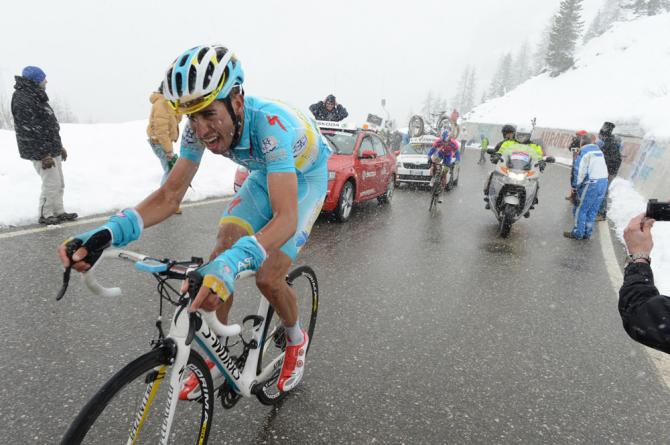
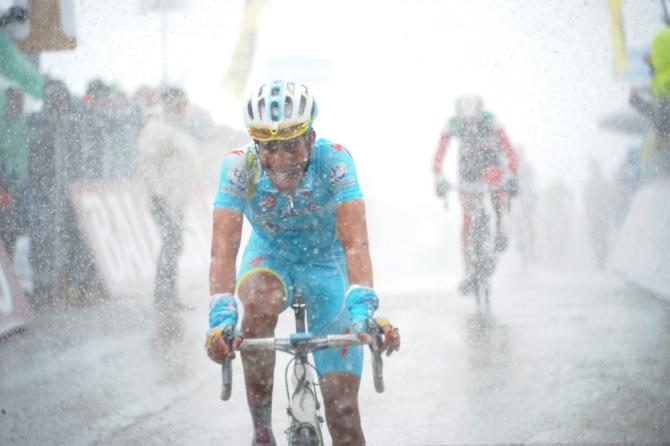
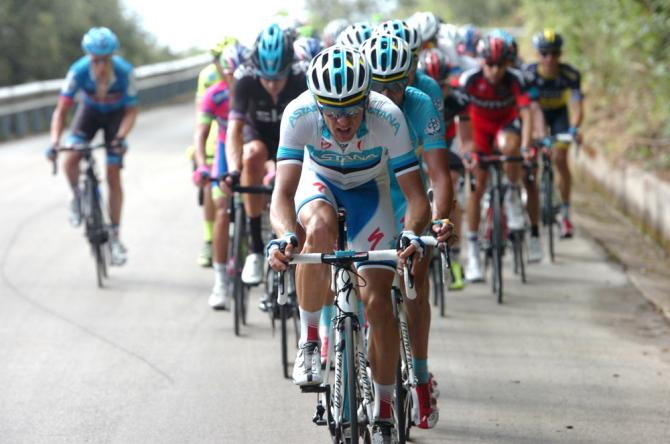
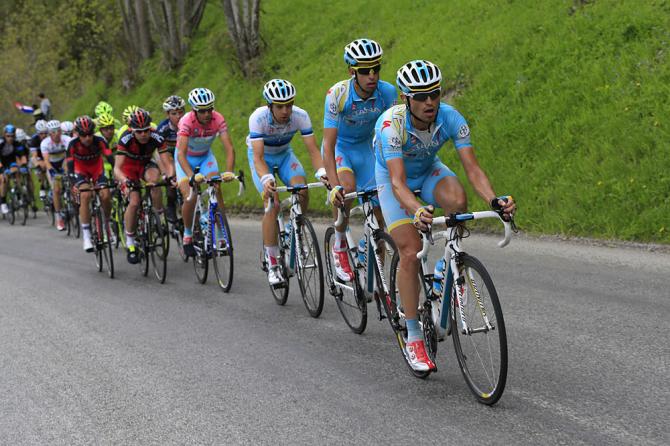
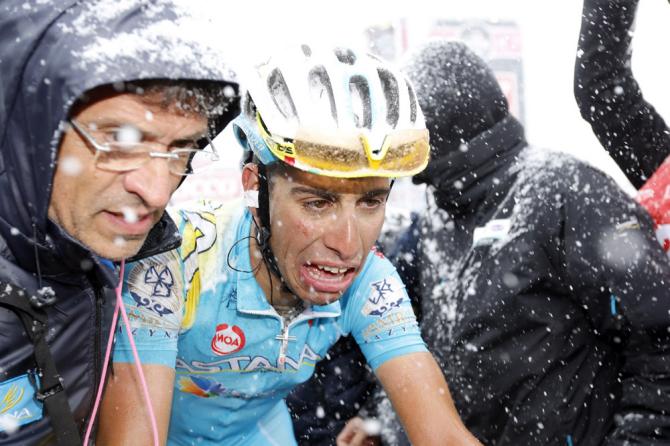
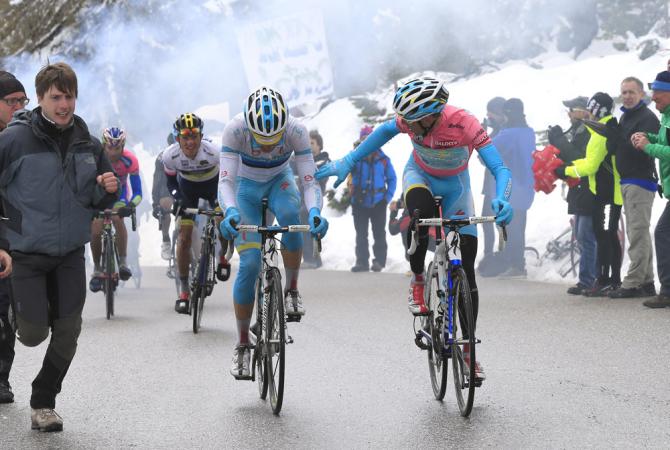
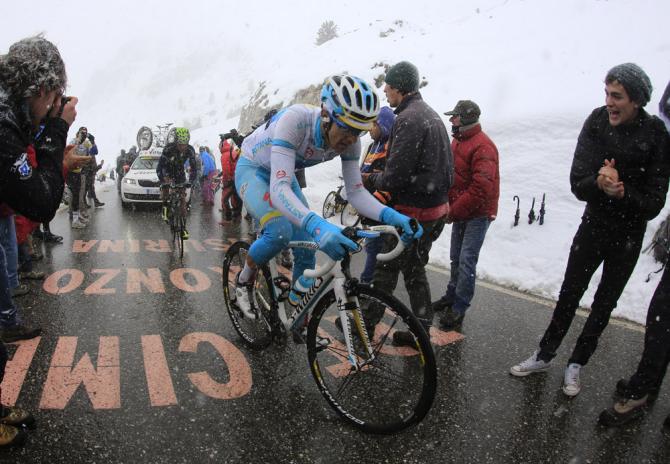
300 metres past the finish line, Valerio Agnoli pulled over to the side of the road and wept openly. Last winter, the Roman had joined Vincenzo Nibali in making the switch from Liquigas to Astana, and after his master had put the final seal on his Giro d'Italia victory by winning in the snow at the Tre Cime di Lavaredo, the emotion of the occasion proved too much for Agnoli.
"I'm just so happy for Vincenzo. I'm ultra-happy for Vincenzo and he really deserved this victory," Agnoli said, wiping his eyes with his sodden gloves.
A television crew drew closer and excitedly asked Agnoli if his tears were caused by suffering through the frigid temperatures and swirling snow that had greeted the peloton on the final climb of the Giro. "No, these are tears of emotion. I'm happy for Vincenzo e basta," Agnoli said, his voice wavering.
Hyperbole is rarely lacking in moments such as these, and another reporter looked to compare Nibali's solo victory on the Tre Cime di Lavaredo with Eddy Merckx's famous impresa on the climb – also in the snow – in 1968. With three kilometres to go, Nibali had pressed his way clear of Rigoberto Uran (Sky) and Carlos Betancur (Ag2r-La Mondiale) and pedalled, at least as far as sections of the home media were concerned, into an almost archangelic realm.
"Dai, Vincenzo is unpredictable and there are no words to describe him," Agnoli said. "I think that Astana has shown great character in this Giro from the very first stages and I think this victory is one for the team too."
Agnoli has been Nibali's uomo di fiducia since he joined Liquigas in 2008, and was particularly prominent during the Giro's testing opening week in southern Italy when many of the rest of the Astana squad seemed to be misfiring.
Indeed, at Bardonecchia on stage 14, Nibali even needed help from allies of circumstance at Vini Fantini-Selle Italia (the since-expelled Danilo Di Luca, in particular), but the team presided over by the problematic figure of Alexandre Vinokourov and managed by Marco Pantani's former directeur sportif Giuseppe Martinelli has grown in strength in the final week.
Get The Leadout Newsletter
The latest race content, interviews, features, reviews and expert buying guides, direct to your inbox!
That said, Nibali's support has tended to come from unexpected quarters. When he joined the squad last winter, Paolo Tiralongo and Fredrik Kessiakoff were ostensibly the men charged with being his sherpas in the high mountains at the Giro, but ultimately, neither man played the kind of role anticipated beforehand.
"This was a bit of a dramatic Giro for me," Tiralongo admitted outside an Astana team car at the top of the Tre Cime di Lavaredo. "I've had a temperature, bronchitis, a crash… I had a bit of everything, really. But we're all happy and tomorrow we'll enjoy the victory. Vincenzo has been a real *grande* in this Giro."
Kangert and Aru
Instead, it was the hitherto unheralded Tanel Kangert who stepped up to the plate with a surprisingly strong showing in defence of Nibali's maglia rosa during the second half of the race. The Estonian champion, who returned to the amateur ranks for a year in 2010 after failing to make an impact at Ag2r-La Mondiale, has been a man transformed since resurfacing at Astana, and has made very noticeable strides in 2013.
As well as riding shotgun with Nibali in the high mountains, Kangert has also helped himself to 14th place overall and at one point near the summit of Tre Cime di Lavaredo, he threatened to do even more. As the gradient reared up to 18 percent, it even appeared as though Kangert and Nibali were simply going to ride away from the field, not unlike Bradley Wiggins and Chris Froome at last year's Tour de France.
Soon afterwards, however, Nibali pulled away, while Kangert eventually slipped back through the splintered leading group and finished the stage in 15th place. "Ah, I couldn't pull long enough because Vincenzo was just too strong," Kangert said of his cameo. "It's the best thing that could happen today. We won another stage and the Giro. The climb was brutal but the snow didn't bother me."
The most startling performance of all, however, came from Fabio Aru. Still only 22 years of age and in his first full season as a professional, the Sardinian helped to set the tempo for Nibali at the foot of the climb and then withstood the arctic conditions to take 5th place on the stage, just 21 seconds down.
Indeed, Aru even came close to catching the three-man group of Uran, Betancur and Fabio Duarte (Colombia) in the finishing straight. The youngster's performance is all the more noteworthy given that he was suffering from illness in the second week of the race, but displayed remarkable powers of recovery in the third.

Barry Ryan was Head of Features at Cyclingnews. He has covered professional cycling since 2010, reporting from the Tour de France, Giro d’Italia and events from Argentina to Japan. His writing has appeared in The Independent, Procycling and Cycling Plus. He is the author of The Ascent: Sean Kelly, Stephen Roche and the Rise of Irish Cycling’s Golden Generation, published by Gill Books.